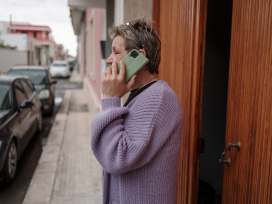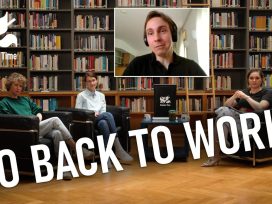An epidemic of fatigue
COVID-19 and mental health
With infection rates on the rise, restrictions are newly coming into force. Experience suggests that lockdowns have a harsher impact on certain sectors of society: young adults, especially those who are already vulnerable, face some of the pandemic’s worst consequences. Yet their needs often go unmet. A Franco-Canadian study suggests a revised approach.

Photo by Kristina Tripkovic on Unsplash
The COVID-19 pandemic continues to dramatically change our lives on a daily basis. The initial full lockdown that was imposed across European countries in the early spring of 2020 led for many to a sensation of paralysis – of being frozen in time. The months that followed altered our relationship to space, time and other people.
Epidemiological studies carried out during this period have shown that the experience and consequences of the lockdown were shaped and marked by social inequality, with poorly paid workers and those living in poor-quality housing being the first to be affected by the virus.1 The summer then gave many a fleeting moment of semi-liberty, but this was followed again by various restrictive measures that interfered with social interactions, relationships to work and the ability to move. Beyond the death rate linked to the virus itself, a form of weariness has taken hold, associated with anxiety or even depression.
Currently up for debate is the place of these mental health consequences within the spectrum of health and social measures that need to be defined and prioritized in order to combat pandemic fatigue. Should the fight against COVID-19 deaths continue to limit social interaction, or is it now time to ‘live with the virus’? Has resuming ‘life as it used to be’ helped us to avoid the pandemic’s indirect consequences, including mental health issues?
Pandemic fatigue
In October 2020, the World Health Organization (WHO) introduced the notion of ‘pandemic fatigue’ into the discourse.2 The phrase refers to the long-term difficulties – including, but not restricted to, mental health consequences – that individuals face in respecting social distancing and other restrictive measures in a pandemic as long-lasting as this one.
At the start of the pandemic, public attention was mainly focused on protecting certain demographic groups (the elderly and people with comorbidities), due to their greater risk of developing severe forms of COVID-19, being hospitalized or dying of the disease. In an attempt to emphasise to the public the importance of respecting distancing measures, the French media have also highlighted the fatigue experienced by health workers, who have had to care for an ever-increasing number of patients in increasingly demanding working conditions.
Children have also been a focus of attention in the wake of scientific debate around their role in the virus’s chain of transmission. The French government’s political decision to leave schools open – sometimes out of step with other countries in Europe and North America – has led to concerns about the detrimental effect of school closures on equal access to education, as well as the fatigue experienced by parents with very young children, who have found themselves having to combine home working with the day-to-day management of their children’s time.

Photo by Antoine J. on Unsplash
After months of invisibility at the start of the pandemic, young adults eventually became a subject of controversy in the summer of 2020. At this point several media sources began to spotlight and denounce behaviour deemed ‘irresponsible’,3 publishing images of young people partying and otherwise failing to respect distancing measures.4 Transmission of the virus from younger to older generations was thus seen as a particular risk to be controlled.5 Towards the end of that autumn, media and public authorities began gradually to realize that the pandemic could also have a damaging effect on young adults, potentially exacerbating mental health disorders and social precarity. This group is clearly one of those facing the worst social, relational and economic effects of the pandemic.
Universities have been closed (while schools in France reopened in May 2020, after a two-month closure), resulting in significant stress for students in higher education who have had to adapt to online course formats without appropriate support. Young people have also faced uncertainty around exam success and career choices, as well as severe social isolation. It is likely these situations, among others, that have given rise to the mental health issues and addictive behaviours documented in studies carried out among students, most often at a local level.6 We can also hypothesise that young adults will suffer more than the rest of the population from the pandemic’s economic consequences, since they are most likely to be in precarious work, most likely to be made redundant by the companies they work for as a result of being the newest employees, and because employment opportunities have become very limited in certain sectors of the labour market, such as catering, tourism, and culture.
Forgotten by the pandemic
The pandemic has given rise to a number of studies demonstrating the detrimental impact of lockdowns, as well as the short-term adaptation strategies put in place by the French government.7 Very little public attention, however, has been paid to young working people, despite the fact that those who are no longer students make up the majority of the ‘young adult’ demographic. There is more than one sense in which this group has been ‘forgotten’ in the pandemic.
In this context, and within the framework of a Franco-Canadian consortium, the authors of this paper initiated a sociological study called FOCUS (France-Canada Observatory on COVID-19, Youth Health and Social Well-being) to document the experience and consequences of the COVID-19 pandemic for young adults (18- to 29-year-olds).8 The data presented in this article are drawn from the first online survey carried out in the study, conducted between October and December 2020. Participants were invited to share their experiences over the six months before the survey, a period covering the time between the end of the first lockdown (May 2020) and the second wave of the pandemic. 4,137 young adults responded to the survey and 3,878 (94%) completed the first section on sociodemographic issues in France. The results presented below were taken from this sample of 3,878 participants.9
In the FOCUS-France data, 56% of the respondents were women and 38% men, while 3% identified as gender non-binary. Students made up 61% of the sample, 28% were no longer students and had entered the labour market, and 11% were unemployed. Of the 61% who were students, 19% were working while studying and 42% were engaged in studying only. The majority (56%) had completed higher education. Slightly less than a third of participants said they live alone (30%), while a third live with their parents (33%), and the final third (36%) with a partner or housemates. In addition, 35% said they had suffered a loss of income following the pandemic, and 27% reported having had to seek out external sources for economic assistance.
In terms of subjective experience, three-quarters of young adults who participated reported having felt a sense of loneliness since the start of the pandemic. Almost half (48%) of the sample had moderate to severe symptoms of depression (measured using the standardized PHQ-9 scale) and only 20% had no symptoms of depression. Three-quarters of the sample reported significant stress as a result of the pandemic. A third of the young adults said they would like to access health services for their mental health issues, but only 25% of these had been able to access them. Among those who wanted to access such services, 76% had moderate to severe symptoms of depression.
The pandemic appears to have had a particularly damaging psychological impact on certain groups of young adults. In terms of socioeconomic profile, young people with a level of education equivalent to or lower to the French baccalaureate (final exams after secondary school), along with unemployed people, people on low incomes and those who have suffered a loss of income due to the pandemic, are most likely to report symptoms of depression. Greater psychological distress in the context of the pandemic has also been experienced by young adults belonging to groups minoritized by sexuality and gender (lesbian, gay, bisexual, asexual, transgender, queer, etc.), ethnic groups with an immigrant background, and those who have recently suffered physical and/or verbal violence and/or discrimination. In addition, young adults who state that they have done their best to respect social distancing and restrictive measures related to Covid-19, as well as those who have lost confidence in the government’s ability to manage the pandemic, say that they feel more vulnerable.

Photo by Sharon McCutcheon on Unsplash
Beyond the specific mental health issues induced by the pandemic, the FOCUS study reveals that young adults do closely adhere to certain preventive measures, but that this adherence is accompanied by the emergence of pandemic fatigue. Measures such as hand-washing and mask-wearing are strictly followed, by 84% and 81% of young adults respectively, while 55% of young adults stay at home to work and study and 31% avoid seeing friends. Pandemic fatigue can be perceived in particular in relation to measures that limit sociability, which can have a significant impact on quality of life. This may lead to an eventual relaxation of preventive behaviours – around three-quarters of young people find it very difficult no longer to be able to see family or friends. The closure of sixth-form colleges, universities, bars and restaurants, and the advent of working from home are relatively slightly better accepted, although half of young adults nevertheless say they find these measures difficult to live with. Finally, measures such as wearing a mask in enclosed spaces or respecting physical distancing are challenging for around a third of young adults.
Also affected by the pandemic has been young adults’ relationship to institutions. More than nine in ten young adults (95%) believe that young people are particularly affected by the economic and social consequences of the pandemic, and 88% feel that the state is not paying enough attention to their needs or their concerns in this regard. Two-thirds (69%) of young adults are ‘very concerned’ about their future, and three-quarters (76%) are ‘worried’ or ‘very worried’ about the health of vulnerable family members.
It is notable, however, that a majority of young people who responded to the FOCUS study, despite widespread pandemic fatigue, are involved in (31%) or would like to get involved in (37%) social or political movements, such as ecology and environmental protection (80%), gender justice (70%) and the fighting against racism and discrimination (60%).
Through the prism of inequalities
These results clearly highlight both the impact of the pandemic on the mental health of young adults and their difficulties in accessing the services they need. Beyond these figures, which support the results of existing public health studies, the pandemic has revealed widespread social inequalities and weakened the most vulnerable groups further. It is interesting to note that those young people who no longer have confidence in the state to manage the pandemic and those who adhere most fully to preventive measures are also those who have been made the most vulnerable by COVID-19. As well as indicating the existence of pandemic fatigue among a significant portion of French youth, the findings of FOCUS study challenge the idea of young adults’ irresponsibility in relation to social distancing measures, and the idea of a generational divide cited by some experts in the media. Our data show that young adults are respectful of the main preventive measures in place and concerned about the health of the most vulnerable.
Sociologists have critiqued the ‘generational divide’ discourse on the grounds that social inequalities should be our primary framework for interpreting the impact of the pandemic, rather than simplistic age-related stereotypes.10 Camille Peugny and Cécile Van de Velde, for instance, have pointed out that the notion of a ‘generational divide’ must be questioned, since it obscures analysis of the social structure of intergenerational inequality by reducing it to a biological phenomenon linked exclusively to age.11 Our survey confirms that, rather than viewing young people purely through the prism of age, we should consider the diversity of social and economic trajectories, along with the realities of discrimination, as essential factors affecting how the pandemic is experienced. The pandemic functions as an indicator, as well as an exacerbator, of social inequalities: young adults suffering the most from the consequences of COVID-19 are also the most likely to have been vulnerable before the pandemic. These young adults are not simply putting up with the pandemic; they are also trying to adapt to this difficult world, attempting to adhere to the most important preventive measures without renouncing their sociality. Although they find it difficult to plan for the future, and lack confidence in the government’s ability to manage the pandemic, young people are keen to see social change and to take part in redefining the ‘post-pandemic world’ by getting involved in various social movements.

Photo by Sasha Freemind on Unsplash
The measures proposed by the government are currently focused near-exclusively on controlling individuals’ behaviour, and on targeting financial aid to ensure that businesses can survive. After more than a year of the COVID-19 pandemic, no major structural measures have been put in place to improve the health and social situation of young adults. The FOCUS study highlights some areas for reflection. It is now imperative to guarantee access to appropriate health services even in times of crisis – and especially afterwards – beyond the ten free sessions with a psychologist that are currently being offered in France. Mental health is a major issue that must be tackled by means of a proper public health program to ensure that young people are supported, informed and able to access the necessary services.
Some young people can manage economically, but it is more challenging for others. This means that proposals for a minimum income for 18- to 24-year-olds – proposals that the French government has not yet implemented – must be put back on the agenda. It is also imperative to enable young people to maintain social ties with family and friends during the pandemic, and to support them in doing so such they can more easily continue to adhere to social distancing measures. Involving young people in defining the measures that affect them could be an important way of restoring dialogue with, and confidence in the French government, which as our study shows has been in decline. Our findings in this respect are backed up by a recent study by the Centre de Recherche pour l’Étude et l’Observation des Conditions de Vie [French Research Centre for the Study and Observation of Living Conditions] (CREDOC), which highlights the high level of resentment felt by young people regarding the French government’s management of the pandemic, particularly young people on lower incomes.12
Since the start of the pandemic, the French government has been urging the population to respect social distancing measures, insisting upon the ‘social acceptability’ of these measures as the only means of restoring the world we used to know. Notwithstanding the fact that our knowledge regarding transmission of the virus remains incomplete, this mode of discourse places responsibility for the spread of the pandemic on individual behaviour, This invocation of responsibility contributes to the prevailing pandemic fatigue in a manner reminiscent of the ‘weariness of the self’ described by Alain Ehrenberg in a different context: that of capitalism in the 1990s.13
Like Ehrenberg’s weariness of the self, pandemic fatigue belongs to a world made up of contradictory demands, where individuals are constantly called upon to act in a spirit of responsibility, in a pandemic-stricken world marked by uncertainty.

Translated by Cadenza Academic Translations.
See N. Bajos et al., ‘When Lockdown Policies Amplify Social Inequalities in COVID-19 infections: Evidence from a Cross-sectional Population-based Survey in France’, BMC Public Health, Vol. 21, No. 705, 2021, doi:10.1186/s12889-021-10521-5.
World Health Organization, Pandemic Fatigue: Reinvigorating the Public to Prevent COVID-19: policy considerations for Member States in the WHO European Region, November 2019, https://apps.who.int/iris/handle/10665/335820.
See R. Knight et al., ‘Young Adults, Unfairly Blamed for COVID-19 Spread, Now Face Stress and Uncertain Futures’, The Conversation, 29 November 2020, https://theconversation.com/young-adults-unfairly-blamed-for-covid-19-spread-now-face-stress-and-uncertain-futures-150608.
See C. Roudaut, ‘Covid-19: des jeunes trop insouciants?’ [Online video], Arte, 14 August 2020; P. Nathan, F. Valetoux, and K. Vuillemin, ‘Jeunes, attention danger: le Covid-19 vous attaque aussi’, Le Monde, 12 August 2020; A. Bristielle and T. Guerra, ‘Sont-ils egoïstes? Pourquoi les jeunes ont du mal à respecter les consignes sanitaires anti-Covid-19?’, HuffingtonPost, 7 October 2020, https://www.huffingtonpost.fr/entry/sont-ils-egoistes-pourquoi-les-jeunes-ont-du-mal-a-respecter-les-consignes-sanitaires-anti-covid-19_fr_5f7db622c5b61229a05a2d05; P. Praud, ‘Covid-19: les jeunes sont-ils inconscients?’ [Online audio recording], RTL, 8 October 2020.
See T. K. Boehmer et al., ‘Changing Age Distribution of the COVID-19 Pandemic – United States, May–August 2020’, Mortality and Morbidity Weekly Report 69, 2020, doi:10.15585/mmwr.mm6939e1.
See A. Essadek and T. Rabeyron, ‘Mental Health of French Students during the Covid-19 Pandemic’, Journal of Affective Disorders, Vol. 277, 2020; M. Wathelet et al., ‘Factors Associated with Mental Health Disorders among University Students in France Confined During the COVID-19 Pandemic’, JAMA Network Open, Vol. 3, 2020, doi: 10.1001/jamanetworkopen.2020.25591; V. Flaudias et al., ‘The Early Impact of the COVID-19 Lockdown on Stress and Addictive Behaviors in an Alcohol-consuming Student Population in France’, Frontiers in Psychiatry, Vol. 12, 2021, doi:10.3389/fpsyt.2021.628631.
See De. Traber et al., ‘L’impact du confinement sur la santé mentale, l’importance des signaux plus fins: Résultats préliminaires de l’enquête Covadapt’, L’Information psychiatrique, Vol. 96, 2020.
The FOCUS research project includes a quantitative component that was conducted online and a qualitative component consisting of interviews with young adults and various stakeholders involved in public youth policies. It receives funding from the Canadian Institutes of Health Research (CIHR) and the Agence nationale de la recherche (ANR) (French National Research Agency, Resilience Covid-19). See focus-covid19.med.ubc.ca.
Our survey is not based on a representative sample of the French population, but on a diversified sample obtained via the multiple modes used to promote the survey online. The results presented in this article do not take into account any missing data; each percentage was calculated from the number of participants who answered the question asked.
See C.Peugny, ‘Le coronavirus porte-t-il le coup de grâce aux jeunes générations?’, Carnet de l'EHESS: Perspectives sur le coronavirus, 2020, https://www.ehess.fr/fr/carnet/coronavirus/coronavirus-porte-t-il-coup-gr%C3%A2ce-aux-jeunes-g%C3%A9n%C3%A9rations.
See C. Peugny and C. Van de Velde, ‘Rethinking Inter-Generational Inequality’ (trans. P. Hamilton), Revue française de sociologie, Vol. 4, 2013, doi:10.3917/rfs.544.0641.
See M. Maudet and A. Spire, ‘Consentement et resistances à la gestion d’Etat de la pandemic’, Politika, 29 April 2021, https://www.politika.io/fr/article/consentement-resistances-a-gestion-etatique-lepidemie.
A. Ehrenberg, The Weariness of the Self: Diagnosing the History of Depression in the Contemporary Age (trans. E. Caouette, J.Homel, D. Homel and D. Winkler), Montreal: McGill-Queen’s University Press, 2010.
Published 15 November 2021
Original in French
Translated by
Cadenza Academic Translations
First published by Esprit 6/2021
Contributed by Esprit © Marie Jauffret-Roustide / Pierre-Julien Coulaud / Julie Jesson / Estelle Filipe / Naseeb Bolduc / Rod Knight / Esprit / Eurozine
PDF/PRINTPublished in
In collaboration with
In focal points
Newsletter
Subscribe to know what’s worth thinking about.
Related Articles

What happened to solidarity?
Fronesis 80–81 (2024)
Analyses of the decline of Scandinavian social democracy: how marketization has destroyed the Swedish model; on the rise of anti-elitist conservatism in Denmark; and dusting down the concept of the professional managerial class.

Sacrificed lives
On Romanian women looking after the elderly in Italy
In Italy, Romanian daycare workers for the elderly are known as ‘badanti’. Their story is one of sacrifice: leaving behind their country and family and losing years of their lives at work. They pay for it with years of their lives and, sometimes, with their health.






